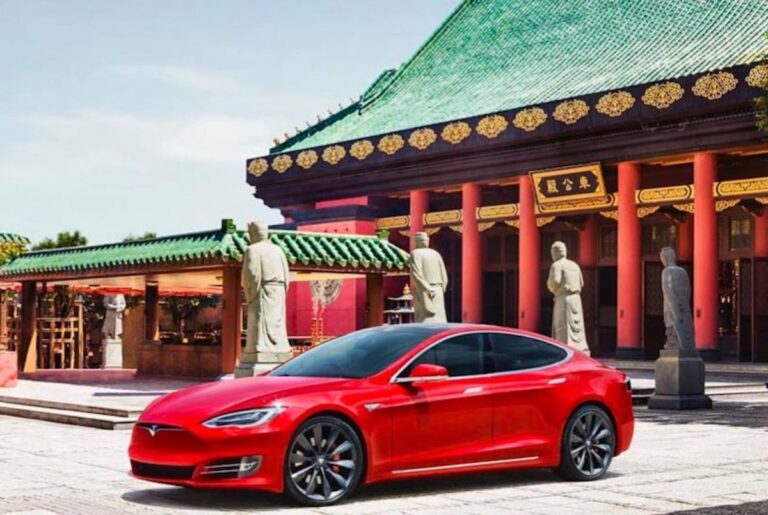One day, Tesla’s experience in China will become a case study in business schools, if not in a good way.
Elon Musk believes he has a special relationship with powerful Chinese government officials. He says there is evidence of that. He said Tesla is the first foreign automaker not required by the Chinese government to work with a local partner.
However, the Chinese Communists are extremely skilled at playing the world-renowned elite to their tune. And that “special relationship” involves them every time.
This has nothing to do with the slowdown in global electric vehicle sales.

China’s overseas business “Public Works Schedule”
In Musk and Tesla’s case, the “takeover” was planned when Tesla started sniffing out the idea of locating in China. Then the clock started ticking on what a friend with decades of experience in China calls the Chinese Communist Party’s (CCP) “public works schedule.”
The history of foreign companies in the People’s Republic of China (PRC) is as follows.
- Foreign businesses thrive with unlimited local support.
- Foreign companies build the market.
- Foreign companies become operating models for local providers to imitate.
- Local businesses and their stakeholders are gaining some sustainability proficiency, in some cases poaching key employees and intellectual property.
- Foreign companies begin to come under pressure with the goal of forcing them out of the market or selling their assets to domestic companies.
- Local companies occupy the market with second-class products.
- Foreign companies are withdrawing from China.
Foreign companies will remain in China as long as they provide profits to the Party.
When the parties decide there is no further merit, the hammer falls.
By the time Tesla entered China, it should have been obvious because this kind of thing had happened many times before. Currently, Tesla’s “business schedule” by the Chinese Communist Party appears to be accelerating.

stagger to tesla
A key inevitable sign that part of the timeline, or end, is near is that foreign companies are being pressured to bring their operations in China under the control of Chinese nationals. These citizens are also subject to national security laws, including the National Intelligence Act of 2017. The law requires Chinese citizens and companies to support Chinese intelligence operations.
Tesla recently announced that Tom Zhu will be taking over the role. He is a senior vice president based in Austin and previously worked for a company in China.
Zhu, who was born and raised in China, currently holds a New Zealand passport. However, for the Chinese Communist Party, it is meaningless for Chinese people to have foreign passports. It is considered a “flag of convenience”, more than just a Chinese passport, and allows for easier navigation around the world. Especially to destinations, universities, and jobs in countries that are rebelling against China.
What’s next?
Tom Zhu will spend the next few months transitioning from his current job to running the entire Tesla business in China. Mr. Zhu and his China operations, currently marked in the company’s PowerPoints and annual reports by reporting directly to Elon Musk, will be shredded and dotted. On the other hand, the reporting line to the Chinese Communist Party will be a solid line with larger letters.

after that?
Musk may retain some utility. In the case of large U.S. multinationals with decades of presence in China (automotive, for one), their initial utility to the party was exhausted years ago. But these companies now serve a new utility: de facto lobbying in the U.S., and especially in Washington, D.C., on behalf of the Chinese Communist Party. As lobbyists, they extoll the virtues of China in general.
Completely coincidentally, in the “Mussolini makes the trains run on time” update, Musk tweeted earlier this year that “China has great trains and infrastructure in general.”
But ultimately, the Chinese Communist Party is likely to reach a “settlement” with Musk over the valuation of Tesla’s assets in China.
art of trading
In two years, Chinese-made Teslas will be clogging China’s roads. Meanwhile, a map showing where Musk’s vehicles are sold and operated around the world does not include China. That space will be blank. Something similar happened with the Big Mac, and McDonald’s previously received the same treatment that Elon Musk is currently receiving.
A hallmark of the Chinese Communist Party’s elegant bargaining techniques is that victims can see the end months or even years in advance, but can’t do anything about it – perhaps exploiting it by extolling the virtues of China’s trains. Other than trying to expand the , we’re hoping to delay the inevitable.
From the Chinese Communist Party’s perspective, the “art” of the deal is that the victims have all the time to writhe in agony, waiting for the inevitable end.
Shareholder lawsuit, anyone?
Grant Newsham is a retired US Marine Corps officer and former US diplomat. he is the author of the book When China Attacks: A Warning to America.
This article was published by JAPAN Forward. Republished with permission.

